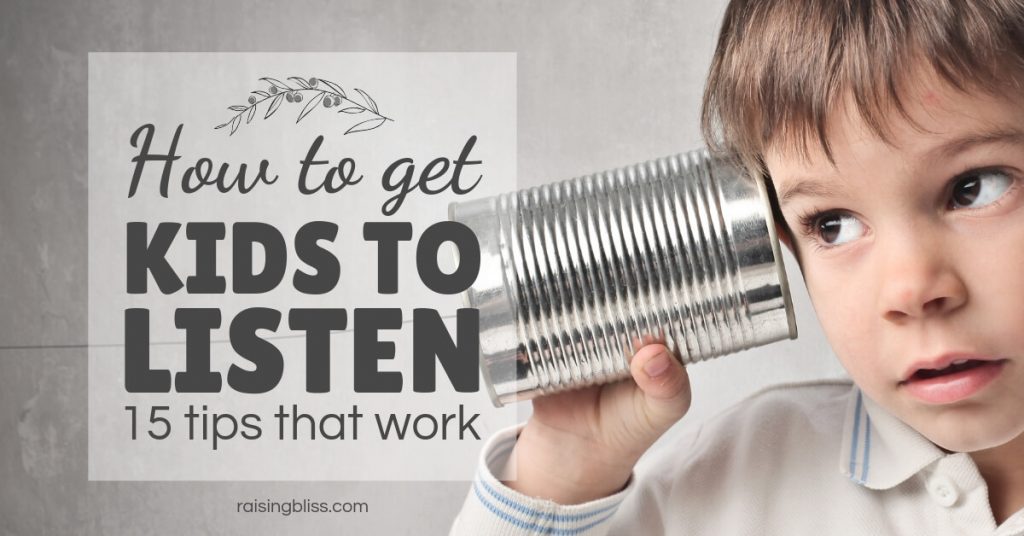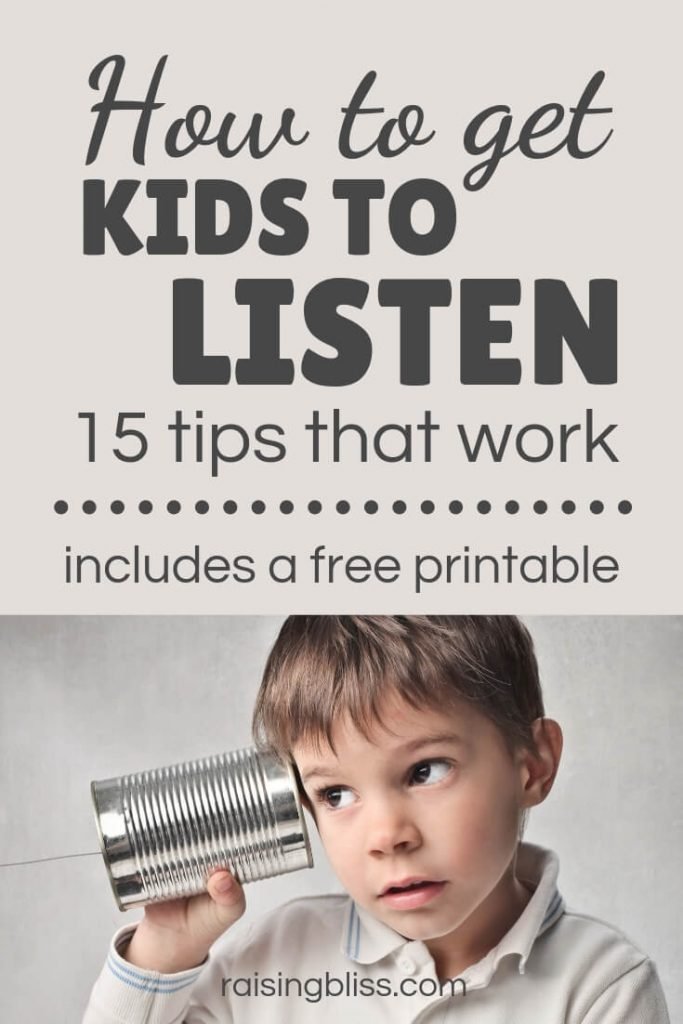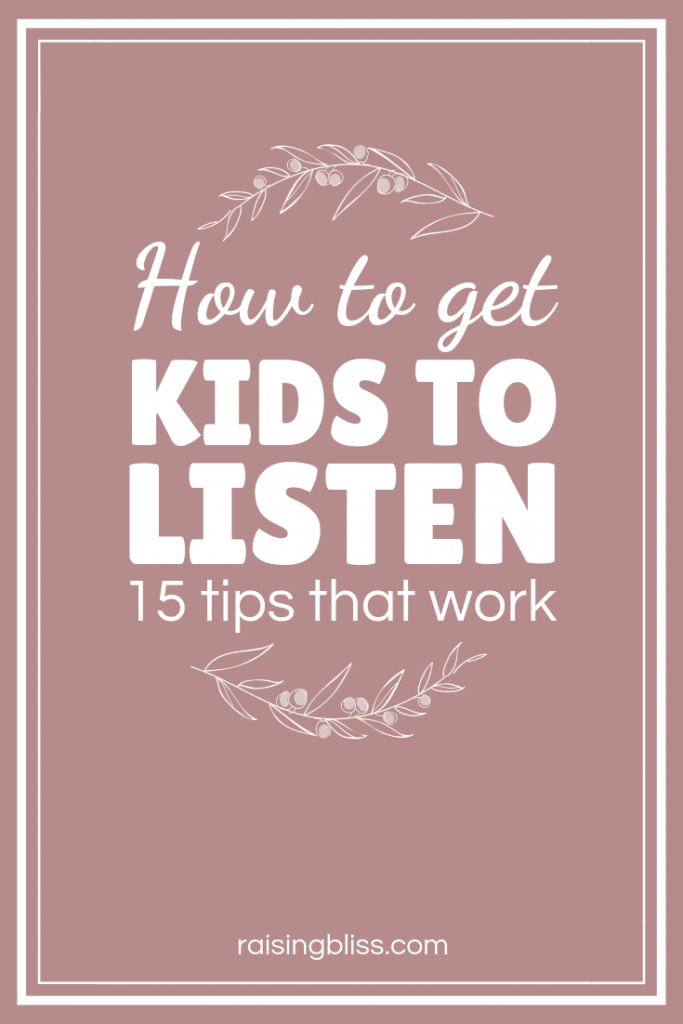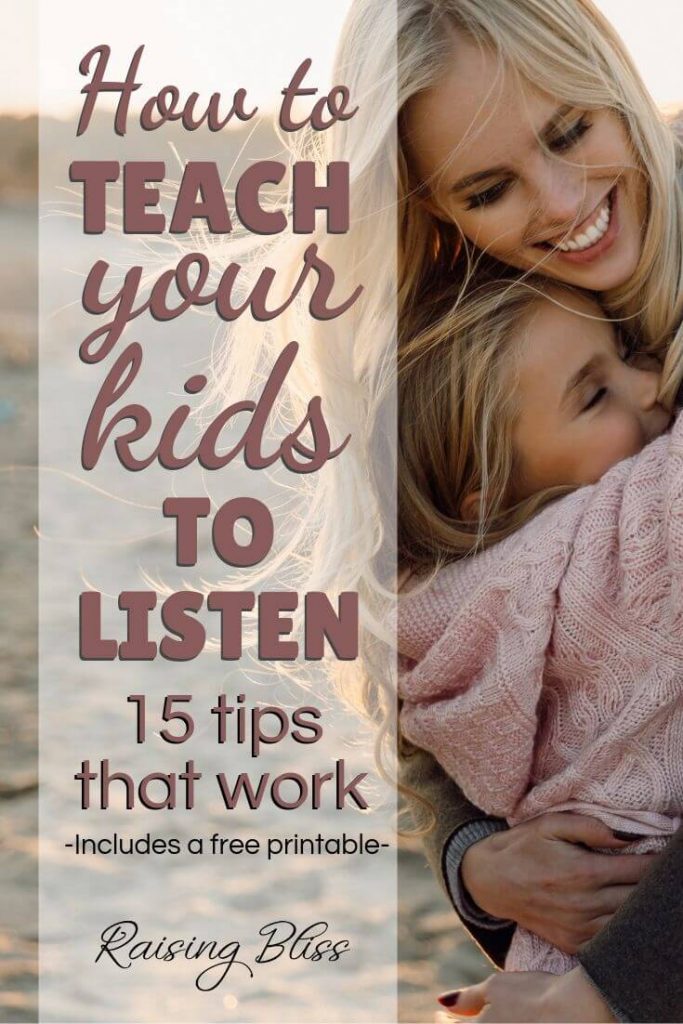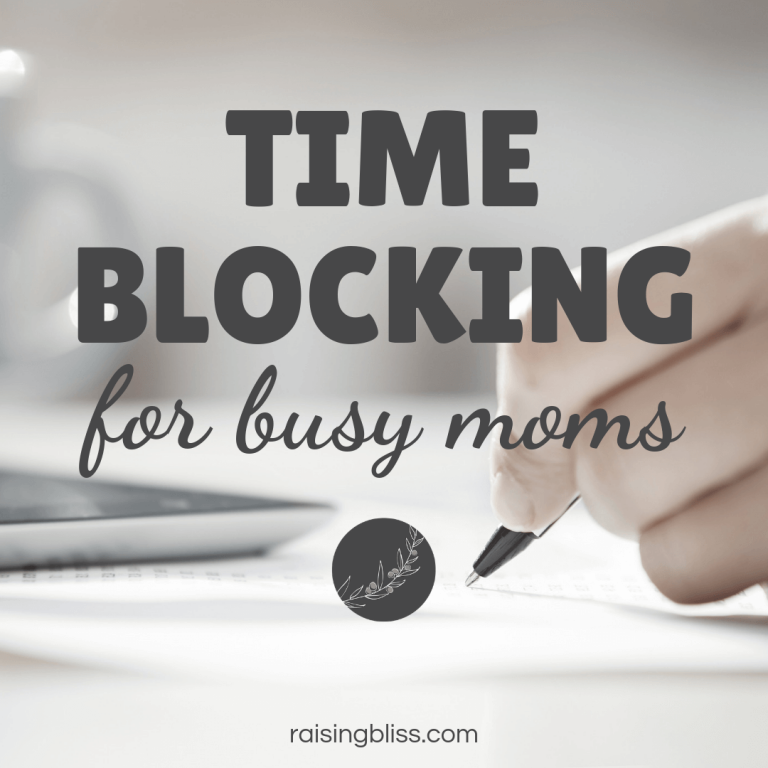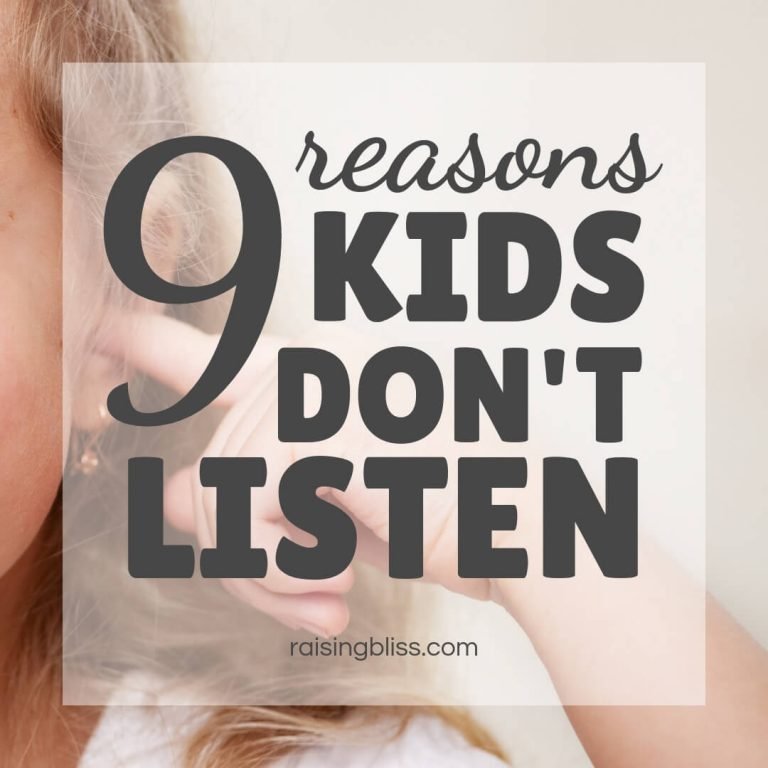How to Get Kids to Listen – 15 Tips That Work
Here’s how to get your child to listen when you speak.
In part one, we talked about 9 reasons kids don’t listen. Today we’ll take a look at how to get kids to listen.
The boys were playing together in their playroom when I heard them start to play rough. Every time they played rough, at least one of them came to me, either holding their hands below their chin to catch the drops of blood coming from their nose, or holding on to a newly forming bruise. I didn’t want to watch another bump on my child grow into a bluish-purple map of Europe right before my eyes.
I went to the stairs and called out, “Please play nice before someone gets hurt!” There was no response or difference in their play.
You know the feeling of talking to a wall? Well, this is worse. At least when you speak to a wall, you don’t expect it to answer. You expect your children to at least acknowledge your existence; and when they don’t, you begin feeling the fuzzies going up from your belly up to your shoulders. And not the good kind.
“This won’t work”, I thought. I went downstairs, walked into their playroom, and stood in the middle of the room. “Shhhhh!” I breathed out. This sound usually got their attention. Most of them stopped playing and a couple of the boys looked at me. Trying to get the attention of the rest, I said, “If you can hear me, hold up your hand.”
They all did, but not everyone was looking at me yet. “Sunny-Boy, look at me please”, I asked the one who was still playing. He did. Now that they were all looking and listening, I spoke. Calmly, I said, “I know you guys are having fun, but it’s getting too rough for comfort. I’m worried someone might get hurt. Please find another game to play.”
One of them shrugged his shoulders, “Okay,” he said. “Let’s go build a lego city!” He called to his brothers as he ran to the lego box. They followed. They were now chatting about the color of the tower they would build.
“Ahh, that’s better,” I thought, and went upstairs to finish cooking dinner.
Sometimes when it seems that our kids don’t hear us at all, we need little adjustments in how we speak to them. Let’s talk about 15 tips on how to get our kids to listen when we speak. Cherrypick from this list of ideas and apply them to your daily life and communication efforts with your children.
1. Go to where your child is
If your child is in another room, put down the laundry you’re holding, and go to where your child is playing. Yelling commands from another room will not help in your communication efforts.
2. Make physical contact
Take your son’s hand in yours or gently hold his shoulders. When kids are preoccupied, this usually gets their attention.
3. Get down to their level
When someone big is hovering over you telling you what to do, it’s hard to feel motivated to listen. Get down to your child’s level and make eye contact before voicing your request.
4. Ask them to repeat what you said
Once you have your child’s full attention, ask her what you want her to do. After this, ask her to repeat what you said. She may have been daydreaming while you spoke, and repeating your request will help her concentrate on it and remember your direction.
5. Don’t be a broken record
Don’t repeat your request over and over again. If your son is busy playing with his toys and it’s almost time for dinner, give him a heads up. “You can play for five more minutes, and then it’s dinnertime.” After five minutes, get his attention again and say “It’s time for dinner now. Please put away your cars and go wash your hands.”
Give him a little time, and if after a minute or two he still hasn’t done what you asked, get down to his level again, and say, “When I say it’s time for dinner, I mean it.” Then take him by the hand and walk him to where you need him to go. Stay calm, and hold his hand gently.
If he cries and runs away, do it again. Soon enough he will realize that you mean what you say and he’ll be more likely to do what you ask.
I found that repeating the request over and over to my children doesn’t work. After asking the same thing several times without results, it’s tempting to start speaking louder in hopes of getting better compliance. Raising my voice at my kids is something I don’t want to do, even if it works.
6. Empathize
When your daughter refuses to leave a playdate, consider her feelings. She’s having a great time playing with her friend and really doesn’t want to leave. Give her a couple of warnings if needed. The 10-minute warning, then the 5-minute warning, or whatever works for you. Then tell her when you plan on coming back or inviting her friend over. This will help her comply with your request.
7. Say your request in one word
Sometimes one-word requests work better than full sentences. If your son repeatedly leaves his shoes in the middle of the living room floor and is pretty much immune to hearing, “Please put your shoes away,” or, “Someone might trip over your shoes and fall,” try something else. Voice your concern in one word. Simply saying “Shoes” after getting his full attention, often does the trick. Same goes for “Teeth”, “Toys”, and “Bed”.
8. Describe what you see
Some ways of communication work better for different kids, even when they’re in the same family. Sometimes we don’t need to tell our children what to do. All we need is to say what we see that’s out of place. For example, “I see toys on the driveway”, or, “The table has crumbs on it.”
9. Tell them why
Kids are naturally very curious. When you’re telling them to do something and they don’t understand why they need to do it, it’s harder for them to comply. Explain the reason behind your request. “When teeth are not brushed, cavities start forming.” Show them pictures of cavities, and tell them how it must feel to have unhealthy teeth. When they understand the reason, they’ll be more likely to listen.
10. Avoid saying “you”
Try to avoid saying “you” when you want your kids to listen. Saying “you” to your child when talking about what they should do can shut them down. When they hear, “You need to put your clothes away,” or “You have to pick up your toys”, they feel criticized and confronted.
Confronted kids tend to push back. Instead, try saying, “Clothes belong on shelves,” or, “Toys go in the bins.” Avoiding “you” will avoid pushback.
11. Use positive words
The word “you” can be used in a positive way. Saying words like “I need you to” instead of “You have to” will better motivate your child to do what you ask.
Avoid saying “Stop”, and “Don’t”. Instead of saying “Stop walking on the curb”, say “I need you to go on the sidewalk, please.” Negative words evoke negative emotions, and when our kids hear them, they’re less likely to comply.
12. Ask them why
After you get your child’s attention and make your request, sometimes kids still don’t listen. Don’t be upset. Kids have opinions too, and they need to be heard and considered. When your son didn’t put on a shirt you gave him, ask him why. Do it kindly, and make sure he knows you are being genuine, and really want to know what he thinks.
He may say “It’s itchy”, or “I don’t like the color”. Consider his reasons. Would you want to wear a shirt in the color you didn’t like? Or an itchy shirt? Try to understand him and ask him what you both can do as a compromise.
13. Validate their feelings
Instead of asking your daughter to stop crying, get down to her level and put her feelings into words. “You are upset because your brother didn’t let you play with his legos.” If that’s the case, you may hear a variation of “Yes!” And she may start crying even louder.
It’s ok, you didn’t make it worse. You’re helping her sort out her feelings. Hug her while she cries on your shoulder. Once she calms down, she’ll be ready to go play again.
14. Give them two choices
Kids love to feel important, as they should. They’re building character, and letting them make their own decisions is a big part of it. Instead of simply telling your kids what you want them to do, try giving them choices.
Offering two choices is usually sufficient. Make absolutely sure that you’re ok with either choice they make. “Would you like to wear the green dress or the pink?” “Do you want me to braid your hair now, or after breakfast?” “Do you want to go to the park or to Grandma’s?”
If your child gives you a third option, consider it. If it works for you, accept it. It’s not about winning the power struggles. It’s about good communication.
15. Praise your children
Our kids love to please us. In order to motivate kids to listen in the future, always praise them when they do what you ask. Every time I praise my children they glow with delight, and often they ask me if I need help with anything else. This post contains affiliate links. This means if you make a purchase after clicking a link, I will earn a small commission, but it won’t cost you a penny more. Click here to read my full disclosure policy.
Kids are people too. Their efforts need to be acknowledged and appreciated.
Here’s a great resource to get kids to listen, a book called How to Talk so Little Kids Will Listen. Not only does it show you the strategies, it also has real-life situations and solutions. I read it myself and recommend it to fellow parents.
The next time you wonder how to get kids to listen, get down to their level, make physical and visual contact, get their full attention, and voice your request. In addition, use the above tips to get your kids to listen, and build strong, healthy relationships with your children.

